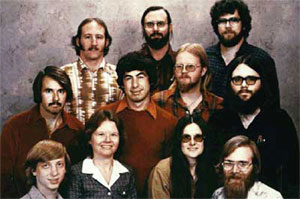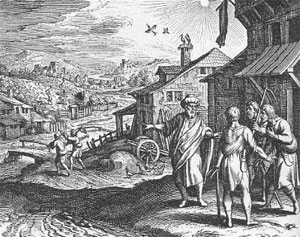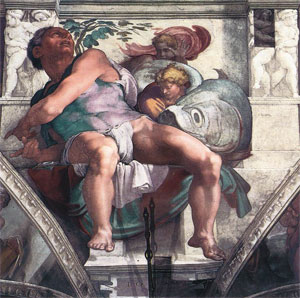Employee #00001
For Sunday September 18, 2005
Lectionary Readings (Revised Common Lectionary, Year A)
Exodus 16:2–15 or Jonah 3:10–4:11
Psalm 105:1–6, 37–45 or Psalm 145:1–8
Philippians 1:21–30
Matthew 20:1–16
 |
Microsoft management team, December 7, 1978. |
In the business world of startup companies, employees who are hired first typically reap the greatest profits, often in the form of stock options that skyrocket in value when the company goes public. People hired last, on the other hand, earn much less. This business model spelled very good news for Marc McDonald, pictured in the middle row, third from the left, in this photo of the Microsoft management team taken on December 7, 1978 (and posted at http://www.microsoft.com/billgates/bio.asp). As Microsoft's first employee Marc wears badge #00001. Thirty-two years after Bill Gates and Paul Allen started the company in 1973, for the fiscal year ending June 2004, Microsoft had revenues of $36.84 billion, and employed more than 55,000 people in 85 countries and regions.
Such are the ways of the world, and more power to Marc and the fortunate few like him. But in the Gospel for this week Jesus tells a parable, a sort of case study, to remind us that the kingdom he inaugurated is very different than the business models of most startups. As he so often did, his punch line shocked his listeners with a radical reversal that subverted conventional wisdom. If we listen carefully today, it should shock us too.
In the parable of the workers in the vineyard, a foreman hired laborers early in the morning, then successively throughout the day at the third, sixth, ninth, and eleventh hours. A twelve-hour day of manual labor, with the "burden of the work and the heat of the day" (20:12), is a long day. That evening the foreman settled accounts, paying those who had worked a meager one hour the same as those who had worked twelve hours. Just imagine if Microsoft hired you this afternoon as employee #55,001, and after the interview informed you that your salary would be the same as Marc McDonald's, or the same as Bill Gates's (the world's richest person with a net worth of $40 billion). You might be thrilled at this turn of events, but Marc McDonald wouldn't be, nor the shareholders.
 |
Parable of the Vineyard, Matthaeus Merian the Elder, 1625-30. |
Nor were the laborers who had worked twelve hours; the parable says "they grumbled against the landowner." Jesus responded that in God's upside down kingdom, "the last will be first, and the first will be last" (20:16). Since he had just made this exact point two chapters earlier (see Matthew 19:30), we can be sure he is reinforcing a point that is near and dear to his own heart. His point is not one about profit margins or minimum wage laws (although if he lived today I think he might have a trenchant parable or two about executive compensation), but rather about the lavish generosity of God's grace in contrast to the niggardly score-keeping that characterizes so many human relationships. He cut to the quick when he responded to the grumblers: "Are you envious because I am generous?" (20:15). The Jesus Way, in other words, is a world of grace and not merit, status reversal instead of status reverence, undeserved generosity rather than pay for services rendered.
The Old Testament reading for this week provides a remarkably apt illustration of Jesus's parable. When God had compassion on the pagan Ninevites, Jonah complained bitterly: "I knew that you were a gracious and compassionate God, slow to anger and abounding in love, a God who relents from sending calamity" (Jonah 4:2).
God's prophetic call had come to Jonah, telling him to go to Nineveh and preach a message of repentance. But he refused and fled some 750 miles in the opposite direction. Nineveh was east of Palestine whereas Tarshish was west, probably in southern Spain. It is easy to criticize another person's disobedience, even a flagrant disobedience like that of Jonah's, until we know or experience their own situation (conversely, we easily forgive our own lapses). Consider the enormity and difficulty of what Yahweh asked Jonah to do. Nineveh was the capital city of Assyria, Israel's traditional enemy and eventual conqueror. With a population of 120,000 people, some classical accounts say it was the largest city in the world in its day. The text tells us that its pagan sinfulness was legendary, as was its cruelty: “It was the people which scorched its enemies alive to decorate its walls and pyramids with their skin.” [FN: Jacques Ellul, The Judgment of Jonah (Grand Rapids: Eerdmans, 1971), p. 26.] Yahweh asked Jonah to go to this city and preach repentance. It was like asking a French person to go to Berlin to preach repentance in 1942. The task felt impossible, and Jonah fled.
But Jonah was not just fleeing an unpleasant calling, he was “fleeing from the Lord” (1:3), a fact which he freely confessed to the sailors on board the ship he had hopped (1:10). He then descended into a suicidal death wish (the first of three such death wishes: 1:12, 4:3, 4:8). Remarkably enough, and here is a prophetic word of grace for us today, God did not desert Jonah to his disobedience or give him up to his own poor choices. Instead, Jonah 1:7 tells us that “the Lord provided.” The provision was a fish that swallowed, saved and then vomited Jonah back on shore. Sometimes God's gracious provision does not even wait for us to turn around; He even takes a suicidal death wish like Jonah's and turns it into an occasion of grace and provision. So Jonah was saved.
 |
Jonah, by Michelangelo, 1511. |
God's prophetic word came a second time to Jonah and this time he obeyed. He traveled to Nineveh and preached to Israel's pagan conquerors. It took three days, and then the unthinkable happened. The city famed for cruelty and wickedness believed the message and repented. The king proclaimed a national day of civic repentance. Nineveh, we read in the text, despite its wickedness, cruelty and enemy status, was a city “important to God” (3:3), a city for which he had great compassion (3:10), a city that attracted His tender concern (4:11). Just as God did not desert Jonah to his own disobedience, He did not desert a pagan enemy city like Nineveh.
Still, Jonah complained openly about God's lavish love toward a sworn enemy. His disobedience to God's initial call was one thing, perhaps understandable due to the magnitude and improbability of the task, but there is something very dark in his second failure: why do we sometimes prefer misfortune for others, divine judgment, rather than God's shalom?
We know that in some sure and certain way God loves all people equally. But the parable of the workers in the vineyard that demotes the first to last and elevates the last to first, along with Jonah who complained about God's tender love for Israel's bitter enemy Nineveh, remind us that He somehow has a special love for the least, for those whom we normally exclude, reject, and even hate. The geography of divine grace that embraces Nineveh and the economy of his love that pays a full day's wage for one hour of work confound our puny and parsimonious human metrics that complain about instead of celebrate divine generosity.
For further reflection:
* Might we compare New Orleans or Baghdad to Nineveh as "cities important to God" (Jonah 3:3)?
* Have you ever regretted God's favor to an undeserving person, like the workers hired first or like Jonah?





